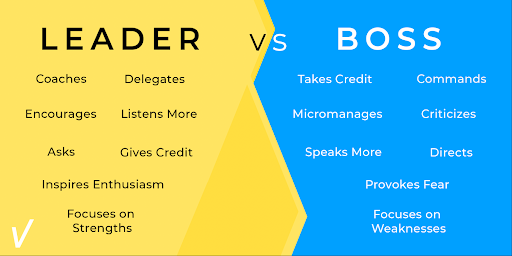- Valor Performance Blog
- Leader vs. Boss: The Key Qualities that Make the Difference
Leader vs. Boss: The Key Qualities that Make the Difference
In today's fast-paced and ever-evolving business landscape, effective leadership plays a crucial role in determining the success of an organization. The impact of leadership goes beyond mere management and control; it encompasses the ability to inspire, motivate, and guide individuals toward a shared vision. However, it is essential to distinguish a leader vs. boss. While the terms are often used interchangeably, their approaches and qualities can significantly impact the work environment and overall team performance. In this article, we will explore the key qualities that differentiate a leader from a boss and shed light on why these distinctions matter.
Understanding the Distinction
To truly understand the difference between a leader vs. boss, we must first define their respective roles. A leader is someone who not only possesses authority but also inspires others to reach their full potential. Leaders focus on building relationships, fostering collaboration, and guiding their teams to achieve shared goals. On the other hand, a boss typically emphasizes control and authority, often disregarding the input and perspectives of their subordinates. The following infographic from Valor Performance visually illustrates the key differences between leaders and bosses.

Qualities of a Leader
Visionary
One of the fundamental qualities of a leader is having a clear vision and the ability to effectively communicate it. Leaders inspire and rally their teams around a common purpose, providing a sense of direction and meaning. By sharing their vision, leaders motivate individuals to contribute their best efforts, fostering a shared sense of enthusiasm and dedication.
Emotional Intelligence
Emotional intelligence is a critical quality for effective leadership. Leaders possess the ability to empathize, understand, and connect with their team members on an emotional level. By recognizing and valuing the emotions of others, leaders create a supportive and inclusive work environment. This, in turn, enhances team morale, collaboration, and productivity.
Empowerment
Leaders recognize the importance of empowering their team members and fostering a sense of autonomy. They delegate responsibilities, encourage innovation, and provide opportunities for growth and development. By trusting their team members and allowing them to take ownership of their work, leaders cultivate a motivated and engaged workforce.
Effective Communication
Communication lies at the heart of leadership. Leaders prioritize effective communication by actively listening, providing clarity, and maintaining transparency. They ensure that messages are understood, encourage open dialogue, and offer constructive feedback. By fostering clear and open lines of communication, leaders build trust, resolve conflicts, and create a healthy work environment.
Traits of a Boss
Authoritarian
Bosses tend to exercise authority without considering the opinions or input of their team members. They rely on their positional power to make decisions, often disregarding the expertise and insights of others. This authoritarian approach can demoralize employees, leading to disengagement and a lack of commitment.
Micro-management
Micro-management is a common trait among bosses, as they feel the need to exert control over every aspect of their team's work. This excessive level of control stifles creativity, erodes trust, and hinders productivity. Trust and autonomy are essential for fostering a productive work environment, and bosses who fail to provide these qualities may find themselves with a disengaged and unproductive team.
Lack of Empathy
Bosses often overlook the emotional needs and well-being of their team members. They fail to understand the impact of their actions on individuals and lack the empathy necessary to create a supportive work environment. This lack of empathy can result in decreased motivation, increased turnover rates, and a toxic work atmosphere.
Poor Communication
Poor communication is another trait commonly found in boss-subordinate relationships. Bosses may fail to provide clear expectations, offer constructive feedback, or engage in open dialogue. This lack of effective communication leads to misunderstandings, decreased productivity, and an unhealthy work environment.
In conclusion, the distinction between a leader vs. boss lies in their approach, qualities, and impact on the work environment. Leaders inspire, motivate, and guide their teams, while bosses tend to focus on control and authority. By embodying qualities such as vision, emotional intelligence, empowerment, and effective communication, leaders create a positive and productive work environment that fosters growth and success.
If you aspire to become an effective leader or desire to develop leadership within your organization, consider exploring leadership training and coaching services. These programs can help individuals develop the necessary skills and qualities to lead with excellence. Visit Valor Performance’s Leadership Development to learn more about our comprehensive leadership development programs.
Remember, leadership is not solely about holding a position of authority; it is about inspiring others to achieve greatness and fostering a work environment where individuals can thrive. By cultivating the qualities of a leader and recognizing the differences between leaders and bosses, we can pave the way for organizational success and personal growth.


